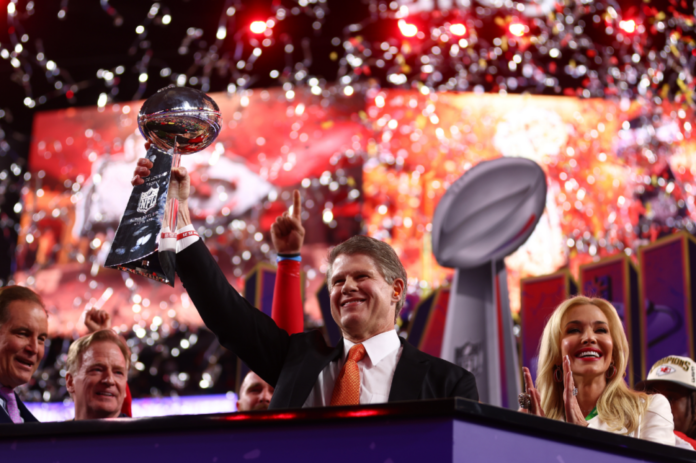
Kansas City Chiefs chairman and CEO Clark Hunt on creating winning cultures
All photos in this article are courtesy of the Kansas City Chiefs.
Clark Hunt, SMU ’86, is a prominent sports executive and businessman, best known as the chairman and CEO of the Kansas City Chiefs and co-owner of FC Dallas. He credits his leadership philosophy style to what he learned under his legendary sports pioneer father Lamar Hunt’s tutelage and his time at Texas Delta. His natural inclination to hard work began in high school, excelling in sports and academics, and he carried this through his university experience by excelling as captain of the SMU Mustangs soccer team. After graduating first in his class and working at Goldman Sachs, he stepped into leading the family’s sports franchises. Clark emphasizes the importance of culture, teamwork, and surrounding oneself with great people, all lessons he learned at Texas Delta. Phi Delta Theta is excited to announce that Clark Hunt will be inducted into the Sports Hall of Fame in Dallas, Texas, on April 10, 2025.
What was it like growing up under successful grandfather H.L. Hunt and father Lamar?
Many people are aware that my dad was one of the great pioneers in sports history. But what they don’t know is that he was also a great dad. I played sports throughout my childhood, then played in high school and college—and my mom and dad almost never missed a game. Even though my dad almost never missed a Chiefs game, he would always make time to attend my high school football games on Friday nights. Even though he had business obligations all over the country, he still made sure to attend most of my soccer games at SMU. My dad left quite a legacy and taught me lots of lessons—the most important of which was how to be a great father.
Why did you pick SMU? What drew you to soccer and becoming team captain? Why did you pick Phi Delta Theta, and what was your fraternity experience like?
My dad attended SMU in the 1950s, and he was a part of the Mustang football team. I also grew up very close to the SMU campus and attended games there from a very young age. So, when the time came to look at colleges, SMU was at the top of my list. Needless to say, it has a beautiful campus, elite degree programs, and an active sports and social scene, so for me it was an easy decision.
I arrived at SMU wanting to do exactly what my dad did: play football for the Mustangs. However, when I was a freshman in 1983, the SMU football team was coming off one of the best seasons in its history. The offense alone had five future NFL players, including guys like Eric Dickerson and Craig James. I enrolled at SMU thinking I was going to be part of the Pony Express, but I quickly realized I was not exactly built for Division I football.
So after a week of football two-a-days, I walked down the hall to the soccer locker room, introduced myself to the coaching staff, and told them I wanted to try out for the Mustang soccer team. In hindsight, that was probably a crazy idea. But in the end, it was one of the best decisions I could’ve made. Later that year, SMU hired Schellas Hyndman, one of the greatest coaches in collegiate soccer history. Coach Hyndman demanded accountability and had very high expectations. He helped shape me into a pretty decent player, and helped shape our team into a national title contender.
In the spring of freshman year, I joined Phi Delta Theta. I originally chose Phi Delt for three reasons: first, it had a reputation as one of the outstanding fraternities on campus; second, Phi Delt had an impressive group of alumni who had really successful business careers; and third, it was a common fraternity for athletes, and there were a number of athletes whom I knew and respected that were already members. One of the great benefits of being a Phi Delt was that each of us had different majors, different activities, and different backgrounds—but we all had a common bond in the Fraternity that tied us together.






















